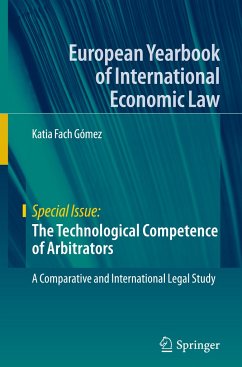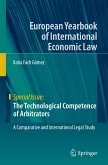Arbitration is facing revolutionary changes due to new technologies' irruption into the entire arbitration proceeding. Wide-ranging technical-legal concepts such as e-discovery, e-hearing, cyber-security protocol, e-deliberations, algorithmic decision-making and digital signing have become part of life. Technology's impact on arbitration is unlikely to decrease after the COVID crisis; on the contrary, how the arbitration community positions itself vis-à-vis technology will be a key factor in determining arbitration's future. Faced with this challenging scenario, the book discusses a novel legal topic: arbitrators' relationship with this increasingly ubiquitous, rapidly-changing technology.
This innovative book applies journalism's "5 W questions" to the underexplored issue of arbitrators' digital competence. It reaches a workable definition of what digital competence in the current arbitration context is, also providing answers to the essential question of why arbitrators' digital competence is relevant from legal and financial points of view. Attention then shifts to who, with reflections on arbitrators working in a highly technological context and clarification of their relationship with other legal and non-legal actors. The book equally offers an in-depth comparative study of the question of where arbitrators' technological competence is regulated, with critical analysis of soft and hard law provisions that may impose a digital competence duty. Finally, the book specifies when arbitrators need to be digitally competent and develops legal proposals regarding key procedural stages (initial conference, hearings) and legal topics (cybersecurity, data protection).
The first study to scrutinise the rapidly changing relationship between arbitrators and technology, the book aims to spark a crucial debate among practitioners and scholars. Academically rigorous and using the latest legal material, it emphasises arbitrators' needs, rights and duties in our technological age, presenting them alongside carefully selected practical topics. The unprecedented and well-grounded proposals for arbitrators' digital competence are intended to be a call to action for its broad target audience.
This innovative book applies journalism's "5 W questions" to the underexplored issue of arbitrators' digital competence. It reaches a workable definition of what digital competence in the current arbitration context is, also providing answers to the essential question of why arbitrators' digital competence is relevant from legal and financial points of view. Attention then shifts to who, with reflections on arbitrators working in a highly technological context and clarification of their relationship with other legal and non-legal actors. The book equally offers an in-depth comparative study of the question of where arbitrators' technological competence is regulated, with critical analysis of soft and hard law provisions that may impose a digital competence duty. Finally, the book specifies when arbitrators need to be digitally competent and develops legal proposals regarding key procedural stages (initial conference, hearings) and legal topics (cybersecurity, data protection).
The first study to scrutinise the rapidly changing relationship between arbitrators and technology, the book aims to spark a crucial debate among practitioners and scholars. Academically rigorous and using the latest legal material, it emphasises arbitrators' needs, rights and duties in our technological age, presenting them alongside carefully selected practical topics. The unprecedented and well-grounded proposals for arbitrators' digital competence are intended to be a call to action for its broad target audience.
"The book is a timely and holistic review of the relationship between arbitrators and technological competence. ... the book serves as a good catalyst to 'spark a debate among arbitration stakeholders on the suitability of incorporating an arbitrator duty of technological competence into texts concerning ethics such as codes of conduct and professional rules.'" (Pijan Wu, Contemporary Asia Arbitration Journal, Vol. 17 (1), 2024)
"Remarkably well-researched yet accessible, the monograph is an easy read, succinct, and free of technical or computer science jargon. It addresses numerous fundamental questions for legal professionals and goes further to envision the future of the practice. The work reveals an emerging new field, not just in arbitration but in the broader legal industry, posing several thought-provoking questions for future research. It serves as an excellent starting point for those interested in the evolving relationship between legal practice and technology." (Ali Dehdashti, International Review of Law, Computers & Technology, March 4, 2024)
"This monograph very relevant to today's practice is the choice of up-to-date literature that the author of the book refers to. ... prof. Gomez addresses at the end of the book, I believe I have intrigued interested readers enough to include this book in their library. ... The book has covered a topic ... that will increasingly be of interest to all arbitrators, arbitration professors, students, and other stakeholders in arbitration in the digital age." (Andrea Nikolic, Law & Economy - Association of Business Lawyers of Serbia, Vol. 62 (2), 2024)
"A comparative and international Legal Study, by Katia Fach Gómez, is an ambitious little book, with a jaw-dropping encyclopedic summary of the relevant literature ... . It fills a gap in the literature and provides a practical, lively and well-documented pathway for future research and scholarship in the area. ... It is strongly recommended, for arbitrators both young and old." (Clifford J. Hendel, Iurgium - Revista del Club Español e Iberoamericano del Arbitraje, Issue 49, 2024)
"Fach Gómez has produced an impressive work of scholarship that synthesizes institutional rules, commentary, and arbitral and judicial decisions into a practical and thought-provoking guide on the technological competencies necessary in arbitration. ... Fach Gómez's book is an essential acknowledgement that arbitration is now done by technological means and, by necessary implication, that it is the duty of arbitrators and practitioners to be competent in those means." (R. Matthew Burke, New York Dispute Resolution Lawyer, Vol. 17 (1), 2024)
"There is no doubt about the ever-growing importance of technology in international arbitration. ... What then is required of arbitrators to effectively perform their duties in this technological landscape? ... This well-researcher book reflects a comprehensive approach to question how we think about this issue now and how it can be clarified in the future. ... this book concludes that arbitrators must be technologically competent, and provides a thoughtful analysis of how such a duty could be implemented." (Colleen Parker Bacquet, ICC Dispute Resolution Bulletin, Issue 1, 2024)
"Remarkably well-researched yet accessible, the monograph is an easy read, succinct, and free of technical or computer science jargon. It addresses numerous fundamental questions for legal professionals and goes further to envision the future of the practice. The work reveals an emerging new field, not just in arbitration but in the broader legal industry, posing several thought-provoking questions for future research. It serves as an excellent starting point for those interested in the evolving relationship between legal practice and technology." (Ali Dehdashti, International Review of Law, Computers & Technology, March 4, 2024)
"This monograph very relevant to today's practice is the choice of up-to-date literature that the author of the book refers to. ... prof. Gomez addresses at the end of the book, I believe I have intrigued interested readers enough to include this book in their library. ... The book has covered a topic ... that will increasingly be of interest to all arbitrators, arbitration professors, students, and other stakeholders in arbitration in the digital age." (Andrea Nikolic, Law & Economy - Association of Business Lawyers of Serbia, Vol. 62 (2), 2024)
"A comparative and international Legal Study, by Katia Fach Gómez, is an ambitious little book, with a jaw-dropping encyclopedic summary of the relevant literature ... . It fills a gap in the literature and provides a practical, lively and well-documented pathway for future research and scholarship in the area. ... It is strongly recommended, for arbitrators both young and old." (Clifford J. Hendel, Iurgium - Revista del Club Español e Iberoamericano del Arbitraje, Issue 49, 2024)
"Fach Gómez has produced an impressive work of scholarship that synthesizes institutional rules, commentary, and arbitral and judicial decisions into a practical and thought-provoking guide on the technological competencies necessary in arbitration. ... Fach Gómez's book is an essential acknowledgement that arbitration is now done by technological means and, by necessary implication, that it is the duty of arbitrators and practitioners to be competent in those means." (R. Matthew Burke, New York Dispute Resolution Lawyer, Vol. 17 (1), 2024)
"There is no doubt about the ever-growing importance of technology in international arbitration. ... What then is required of arbitrators to effectively perform their duties in this technological landscape? ... This well-researcher book reflects a comprehensive approach to question how we think about this issue now and how it can be clarified in the future. ... this book concludes that arbitrators must be technologically competent, and provides a thoughtful analysis of how such a duty could be implemented." (Colleen Parker Bacquet, ICC Dispute Resolution Bulletin, Issue 1, 2024)








